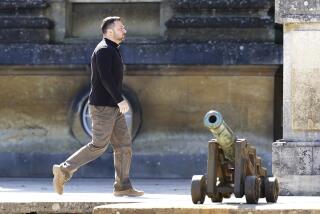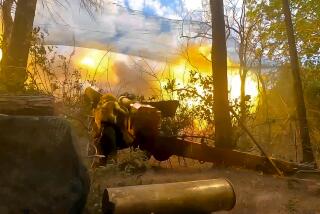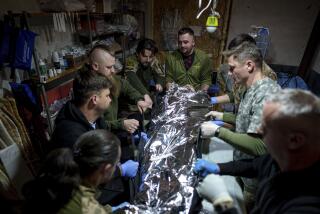Russians Meet Indignation in Rebel State
- Share via
CHERVLYONNAYA, Russia — Russian troops moving into the heavily armed secessionist republic of Chechnya halted their advance here 20 miles northeast of the Chechen capital Monday and met an unexpected form of resistance--a crowd of men wielding only their indignation.
“This is our land. Get out!” shouted a gold-toothed Chechen in a tall fur hat, standing eyeball to eyeball with Col. Ivan Gromov, a commander of an armored column of the Russian Interior Ministry.
“Could you move your crowd back off this bridge,” Gromov ordered in a booming voice.
“Move your soldiers back,” retorted the man with the gold teeth, as about 150 Chechens around him stood their ground. “Listen,” he added. “Did we ever invade Russia with arms? No. We’re defending our homeland and we have nowhere to retreat.”
The shouting match above a drainage canal bordering this farming village reflected the tense, mostly bloodless standoff that has prevailed since Russian forces began their tentative and risky occupation of Chechnya on Sunday morning.
The Kremlin justified the military offensive as a forced measure to defend Russia’s integrity and create the conditions for a negotiated peace. Chechnya, a mountainous republic with a largely Muslim population of just more than 1 million, declared its independence in 1991 soon after President Dzhokar M. Dudayev, a charismatic former bomber pilot, came to power.
Its continued defiance prompted Boris N. Yeltsin into one of the riskiest moves of his presidency, a major military campaign that many warn could pull in other small nations of the Caucasus Mountains’ ethnic patchwork and bog down into another Afghanistan-type war.
The first clashes that Russian troops faced on their rapid advance toward the Chechen capital of Grozny underlined the danger of a broader Caucasus war. In neighboring Ingushetia, pro-Chechen villagers attacked a Russian column on its way toward Grozny and, according to Defense Minister Pavel S. Grachev, burned 30 vehicles. Another Russian column advancing through nearby Dagestan was blocked by residents, and nearly three dozen soldiers were reportedly taken captive.
In Chechnya proper, 18 miles northwest of Grozny, Chechen artillery forced a Russian tank column to turn back by attacking it with truck-launched Grad missiles. The attack brought a fruitless retaliatory raid by Russian jet fighters and helicopters. Their bombs ruptured and set fire to a gas refinery pipeline, but the fire was quickly extinguished.
Sgt. Usman Saltayev, commander of the Chechen artillery unit, said he saw three plumes of smoke rising from the line of about 40 Russian tanks before it turned back. Russian media said soldiers had died, but it was not clear how many.
Meanwhile, Moscow-Grozny peace talks got under way in the Caucasus city of Vladikavkaz, although reports from the negotiations were contradictory. Some said a preliminary agreement could be struck within hours; others said it would take weeks at best.
In Moscow, the political fallout for Yeltsin continued to mount. Public displeasure with the military moves sparked several anti-war protest meetings and criticism of the Chechen offensive by almost all top politicians. The only enthusiastic support came from ultranationalist Vladimir V. Zhirinovsky.
The Duma--the lower house of Parliament--resolved to meet today to make its own decisions on the Chechnya crisis. Yeltsin, who remained out of sight following a minor operation on his nose, appealed to lawmakers not to choose this moment to inflame tension with the Kremlin, but to little avail.
“We Orthodox Russians are being dragged into a war with the Muslim world,” warned Communist leader Gennady A. Zyuganov. “Only early elections in Russia can prevent the bloodshed in Chechnya.”
Inside Chechnya, the two sides appeared to be trying to avoid a head-on confrontation, at least while negotiations continued.
In return for Russian pledges to refrain from attacking Grozny while peace talks are still under way, the Chechens did not raise an armed challenge to Col. Gromov’s tank column as it moved about 70 miles from Mozdok in Russia and stopped here, northeast of Grozny, on Monday morning.
The truck-launched missile attack was the only confirmed combat on a cold, clear day otherwise dominated by doomsday rhetoric from Dudayev’s defenders.
The standoff on the bridge ended with a slight retreat by the unarmed Chechen crowd. But the grumbling in both camps continued, bespeaking the intractable nature of the conflict.
“Have you ever tasted homemade Russian vodka?” asked Gromov, a veteran of other ethnic conflicts in the former Soviet Union. “Well, the situation in Chechnya is brewing into a far stronger drink. We are unprepared for what will happen here if the cork comes out of the bottle.”
Along one side of the road, stretched for two miles in a field, were as many as 1,000 troops under Gromov’s command, many lounging beside tanks and armored personnel carriers.
On the other side of the road, the stone-house village of 13,000 people waited nervously for Gromov to get his next orders. Nobody seemed to be working.
Villagers said they spent a fright-filled night Sunday as the tank column advanced toward them and then stopped.
Mayor Musa Gaichayev led a group of village elders Monday to meet Gromov and ask respectfully what his troops were doing there. “My mission is simple,” the colonel told them. “It is to make people surrender all illegal weapons.”
That is a tall order in Chechnya, where hunting rifles and automatic weapons are practically part of the dress code--especially since the hasty 1991 pullout of the Soviet army left the region awash in arms.
Fearing bloody resistance if the Russians entered their village, the Chechen elders agreed to disarm any provocateurs on their side if the Russians would keep on the other side of the road.
Gromov agreed but later complained that nobody had surrendered any weapons.
“These village elders are like the queen of England,” he said. “They govern, but they do not rule.”
Villagers who came out to berate the Russians heatedly denied that they were armed--although one man proudly showed off a hunting rifle. The villagers’ assertions drew winks and nods from the elders.
“We will disarm when the Russians themselves disarm and go home,” declared Katash Khashumov, 62, a village leader clad in a gray lambskin hat.
The crowd consisted of elders, middle-aged men and a 12-year-old boy. Villagers of fighting age, they said, had withdrawn to Grozny to defend the city against what they consider Gromov’s real mission--to overthrow Dudayev.
At the Grozny city limits, Chechen warriors in camouflage staffed a concrete-block checkpoint illuminated by a flaming tire.
Ali Ilyasov, 34, was commanding the checkpoint with a Kalashnikov rifle and a vest loaded with five hand grenades.
“They must know better than to move on Grozny,” he said. “Every Chechen there is an atomic bomb.”
Grozny, a city of 400,000 people, was outwardly calm but evidently crippled by three years of political and economic conflict with Moscow.
Garbage and broken glass littered the ice-rutted streets. The entire city, including Dudayev’s 10-story presidential palace, was without heat because of mine attacks three months ago on municipal heating plants.
Many Chechens said that, whatever they thought of their president before, they support him in this battle against Russia. And their confidence was striking.
“They won’t take Grozny,” said Yakub Sultygov, the minister of cattle. “If they do, all they will capture is a pile of ashes.”
Times staff writer Carey Goldberg in Moscow contributed to this report.
More to Read
Sign up for Essential California
The most important California stories and recommendations in your inbox every morning.
You may occasionally receive promotional content from the Los Angeles Times.













